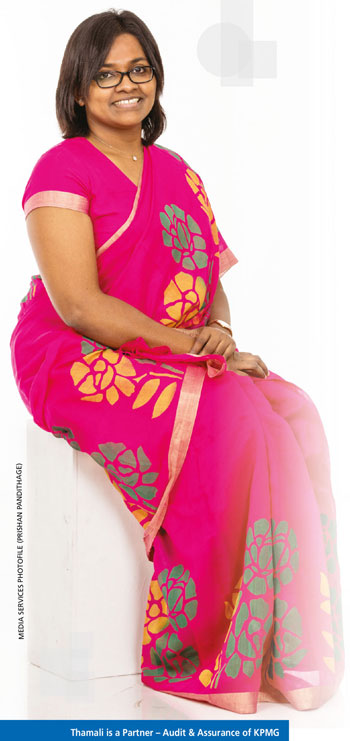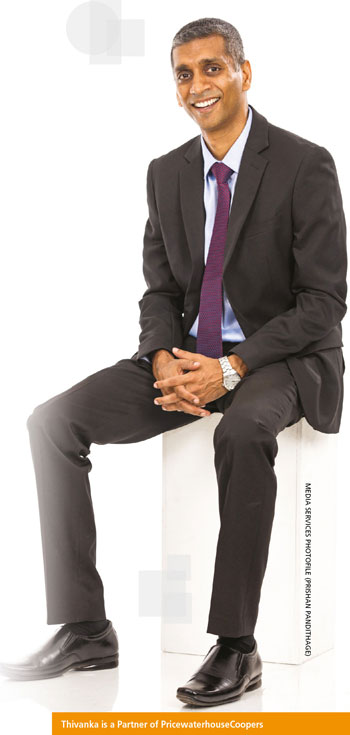AUDIT PROFESSION
SHORT TAKES
Compiled by Savithri Rodrigo
Thamali Rodrigo
Thivanka Jayasinghe
Q: What is your assessment of Sri Lanka’s audit profession in recent years?
Thamali Rodrigo (TR): With transactions becoming more complex, stringent regulations being introduced and greater supervision by regulators, the profession is stepping up to overcome the many challenges it has faced in the past.
Thivanka Jayasinghe (TJ): Sri Lanka is aligned with the latest global accounting and auditing standards, which the local audit profession must maintain. It comes under extensive monitoring with a growing emphasis on regulatory oversight in recent years.
Q: How would you define a ‘high quality audit’?
TR When users of financial statements can get an accurate view of the entity, and the auditor deduces that it complies with accounting standards, regulations, governance and ethics.
TJ It’s a systematic and objective assessment of the client’s financial statements that has been performed in accordance with relevant auditing standards.
Q: What factors are driving the demand for auditing in Sri Lanka?
TR Capital markets are driven by accurate financial reporting and auditors play a key role by providing assurance to investors. With more entities requiring investors and equity capital, there will be an increased demand for quality audits.
TJ Regulatory requirements would be the most important factor together with lenders seeking independent comfort over the borrower’s financials, and shareholders and other stakeholders seeking comfort over the financials.
Q: Is there adequate regulatory or policy support for the local profession?
TR Regulations are stringent when it comes to auditors in both global and local contexts. While this is a positive, oversight by regulators in relation to all corporate categories is limited. Auditors alone cannot rectify the system; this should be achieved collectively together with the regulators.
TJ The Institute of Chartered Accountants of Sri Lanka (CA Sri Lanka) extends support but its plans for performing independent reviews on audit firms’ quality systems must be strengthened. The Sri Lanka Accounting and Auditing Standards Monitoring Board has increased capacity to support and monitor the profession, which must be maintained consistently. More is needed through coverage of SMEs and NGOs so that audit quality is maintained regardless of an entity’s size.
Q: Are the methodologies in use agile enough to respond to emerging risks and technology?
TR The methodologies of global audit firms evolve frequently to meet corresponding risks and challenges. Local firms that have an international presence must comply no sooner the changes are implemented globally.
TJ The profession keeps pace with global auditing standards. Spending adequate time to identify organisational risk impacting financial statements is critical to this methodology. Methodologies must improve to keep pace with evolving technological changes related to risks and tools.
Q: Is the profession leveraging on the appropriate tools and talent to deliver smarter results?
TR Yes. The quality of audits has improved as a result of the use of data analytic tools.
TJ Globally, larger firms make substantial investments in developing or leveraging on new tools to deliver smarter results with some local firms doing the same. Nevertheless, audit fees charged in Sri Lanka are probably the lowest in the world.
Q: Do you believe the market offers sufficient choice and competition?
TR The ‘big four’ are represented in Sri Lanka along with some good second tier firms so choice is available provided that corporates assess the value of such services.
TJ For a market of the size of Sri Lanka, there’s adequate choice.
Q: Why is the role of auditors important in the public sector?
TR The public sector has the largest number of stakeholders; the sector consumes public funds and hence must have good governance principles that lead to better financial discipline and create increased social value.
TJ The public must have confidence that the financials presented offer a comprehensive picture of how their money is being spent. A public sector audit will also cover the effectiveness, efficiency and economy with which this money is being used.
Q: In which key ways can the audit framework be extended to SMEs and social enterprises?
TR Primarily by creating awareness regarding the benefits of accurate reporting and the need for transparency. Banks and financial institutions should lend based on SME cash flows and financial strengths, which will also drive the need for accurate reporting and audits.
TJ CA Sri Lanka recently introduced an audit framework to be used for SMEs that is designed to be more practical. There’s also a ‘Sri Lanka Statement of Recommended Practice for Not-for-Profit Organisations including NGOs’ to improve the quality of their financial reporting.
Q: What are the main challenges to improving the impact of audits?
TR Investing in technology, and training and retaining fully qualified staff within audit teams, which heralds an increase in costs that the market isn’t ready to meet as yet.
TJ Stakeholder expectations are increasing every day, and there is a gap between their expectations and what auditors are duty-bound to deliver.
Q: How are firms addressing growing cybersecurity concerns?
TR While clients are warned about cybersecurity concerns, highly trained teams are available to provide solutions.
TJ Most large firms have units specialising in cybersecurity. The frequency of attacks has increased globally and locally – hence the growing demand for services to address these risks.
Q: What are your growth projections for the audit profession?
TR As in all industries and professions, the audit profession will grow along with the economy. We focus on introducing globally available services so that industries have access to the value added services available in developed economies.
TJ The audit profession will grow in alignment with economic growth. However, audit firms have transformed into professional services firms covering a variety of other services, which provide much higher growth opportunities than audit services.
Q: How will audit functions need to evolve in the future?
TR They will be required to invest in digitisation, robotics and process automation.
TJ Audits must increasingly leverage on technology including data analytics and AI to cover large amounts of data versus checking a random sample. The only way auditors can meet rapidly increasing stakeholder expectations and demands of audits is by investing, and keeping pace with technology and digitisation.








Fraud and irregularities are very high in Sri Lanka’s trade and business – in the form of bribery, corruption, commissions and abusing procurement and tender processes. Should auditing standards be revised and the depth of audits increased to minimise or eradicate such things?
The most important aspect in the audit profession isn’t covered here… the pay and the job conditions of audit professionals.
Agree with Mr. Jayasinghe, the people and stakeholders are expecting more from the profession.